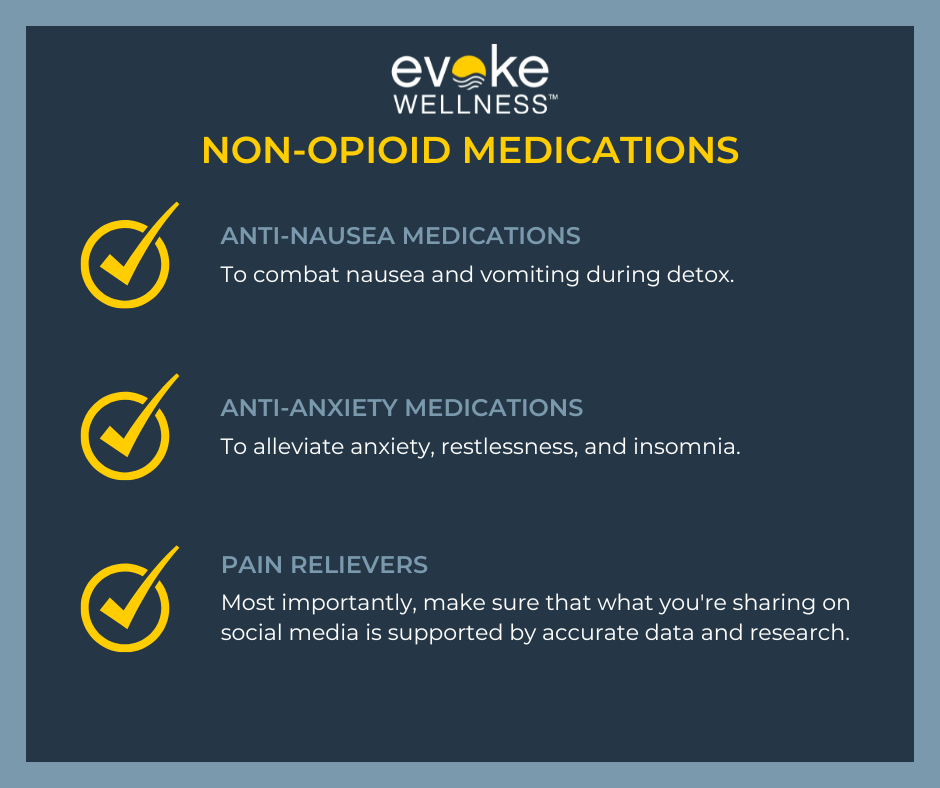As you embark on the challenging journey of detoxification, managing physical pain and discomfort becomes paramount. Recent studies indicate that up to 80% of individuals undergoing medical detox experience significant physical symptoms. Whether you’re facing alcohol detox or acute detox from other substances, implementing effective strategies can make a substantial difference in your recovery process. At Evoke Wellness at Hilliard, we understand the complexities of withdrawal and have developed comprehensive approaches to alleviate your discomfort. This article will explore evidence-based methods for managing pain during detox, empowering you with the knowledge to navigate this critical phase of your recovery journey successfully.
Together, let’s embrace the journey to recovery and the promise of a new beginning. Call us at (833) 949-1347 today or reach out online.
Understanding Physical Pain and Discomfort During Detox
The detoxification process, though a vital first step towards recovery, is often accompanied by significant physical discomfort and pain as the body rids itself of the substance(s) it has become dependent on. According to Evoke Wellness Ohio, common withdrawal symptoms can include anxiety, restlessness, nausea, vomiting, tremors, seizures, sweating, fever, insomnia, and even hallucinations.
Withdrawal Severity & Duration
The intensity and duration of these unpleasant withdrawal effects largely depend on factors such as the type of substance(s) abused, the duration and amount of use, and the individual’s overall health and metabolism. A study cited by Evoke Wellness found that over 60% of individuals who complete comprehensive addiction treatment remain sober after one year, compared to just 25% attempting to quit alone – underscoring the challenges of self-detox.
Medical Detox Support
Attempting to detox at home without medical supervision can be extremely dangerous, even life-threatening, due to the risk of severe complications like seizures or delirium tremens. Professional medical detox programs provide 24/7 monitoring and interventions to safely manage uncomfortable and potentially hazardous withdrawal symptoms. Licensed staff can administer FDA-approved medications to alleviate cravings and discomfort.
Acute Detox Care
For those struggling with severe substance use disorders or co-occurring mental health conditions, acute detoxification services offer a higher level of intensive medical care. This supportive environment allows patients to begin their recovery journey safely and comfortably, setting the stage for continued comprehensive treatment.
Common Physical Withdrawal Symptoms
Flu-Like Symptoms
Many recovering individuals experience flu-like withdrawal symptoms as their bodies readjust without the substance. This can include fever, chills, nausea, vomiting, muscle aches and fatigue. According to a study by the National Institute on Drug Abuse, these symptoms typically peak within the first 72 hours of detox and gradually subside over 5-7 days.
Sleep Disturbances
Insomnia, night sweats, and vivid dreams or nightmares are common physical manifestations during detox. In Ohio, nearly 1 in 5 adults report insufficient sleep, which can significantly impact recovery. Professional detox programs provide a safe, supportive environment to help regulate sleep cycles.
Psychological Symptoms
In addition to physical effects, many experience psychological withdrawal symptoms like anxiety, depression, irritability and mood swings. A study published in JAMA Psychiatry found that nearly 30% of those with substance use disorders also had an independent mood or anxiety disorder. Dual diagnosis treatment addresses both issues concurrently.
Cravings and Relapse Risk
Perhaps the most challenging symptom is intense, persistent cravings for the abused substance. Drug cravings involve the brain’s reward and motivation circuits, driven by environmental cues and stress. Around-the-clock medical supervision during inpatient detox helps safely manage cravings and reduce relapse risks.
Managing Pain and Discomfort Through Medication
During the detox process, managing physical pain and discomfort is a critical aspect of ensuring a safe and effective recovery. Withdrawal symptoms can be severe, often peaking around day 3, and can involve intense physical discomfort, cravings, and emotional upheaval. According to a study by Stanford’s Human-Centered AI group, medication-assisted treatment (MAT) programs have proven effective in helping patients manage withdrawal symptoms and cravings during addiction recovery.
Opioid Replacement Therapies
One common approach involves opioid replacement therapies, such as:
- Suboxone Treatment Program: A combination of buprenorphine and naloxone, this medication reduces opioid cravings and blocks the effects of opioids, as mentioned on the Evoke Wellness Ohio website.
- Methadone Treatment Program: Utilizes methadone, a long-acting opioid, to alleviate withdrawal symptoms and cravings for those struggling with opioid addiction.
Non-Opioid Medications
In addition to opioid replacements, various non-opioid medications can be prescribed to manage specific withdrawal symptoms, such as:

Integrated Approach
Effective pain and discomfort management often involves a combination of medications tailored to the individual’s needs and integrated into a comprehensive addiction treatment approach. As noted on their website, Evoke Wellness Ohio incorporates MAT programs alongside medical detox, residential treatment, and various evidence-based therapies. This holistic approach aims to provide a structured, supportive environment for patients to safely manage withdrawal symptoms and increase their chances of achieving long-term recovery.
Alternative Therapies to Minimize Discomfort
During detox, the body experiences intense physical and psychological withdrawal symptoms that can be highly uncomfortable. While medications help manage the acute effects, incorporating alternative therapies into the treatment plan can further minimize discomfort and promote overall well-being.
Mindfulness Practices
Mindfulness-based interventions like meditation, deep breathing exercises, and yoga have proven beneficial in addiction recovery. A study published in the journal Substance Abuse found that mindfulness practices can reduce stress, anxiety, and drug cravings during detox and early recovery.
Meditation helps patients stay grounded in the present moment, rather than dwelling on past substance use or anticipating future cravings. Deep breathing exercises promote relaxation and counteract the physiological stress response triggered by withdrawal.
Acupuncture
This ancient Chinese practice involves the strategic placement of thin needles on specific points of the body to restore energy flow. Research from the National Institutes of Health suggests acupuncture can alleviate withdrawal symptoms like nausea, anxiety, and insomnia during detox.
By stimulating the release of endorphins – the body’s natural painkillers – acupuncture provides a drug-free way to manage discomfort and cravings.
Exercise and Movement Therapy
Gentle exercise and movement therapies like yoga, tai chi, and light aerobic activity can be incredibly beneficial during detox. According to the Substance Abuse and Mental Health Services Administration, exercise increases endorphin levels, improves sleep quality, reduces stress and anxiety, and provides a healthy coping mechanism for cravings.
Low-impact activities like walking or stretching can be easily incorporated into the daily routine at a detox facility, promoting physical and mental well-being.
Nutrition and Supplementation
Proper nutrition is crucial for replenishing depleted nutrients and restoring biochemical balance during recovery. A nutritious, whole-food diet rich in vitamins, minerals, and antioxidants can help reduce withdrawal severity and boost overall health.
Certain supplements like omega-3 fatty acids, vitamin C, and magnesium may also be recommended to minimize discomfort and support the healing process.
When combined with traditional medical treatments, these alternative therapies offer a holistic approach to detox, empowering individuals to manage withdrawal symptoms more effectively and build a strong foundation for lasting recovery.
Creating a Comfortable Detox Environment
Controlled, Trigger-Free Setting
For a successful detox experience, it’s crucial to remove any potential triggers or access to addictive substances. Professional medical detox centers provide a controlled, trigger-free environment, ensuring a safe and comfortable withdrawal process. This controlled setting significantly reduces the risk of relapse and increases the chances of long-term recovery.
24/7 Medical Monitoring
One of the key benefits of professional detox is the round-the-clock medical supervision and care provided by addiction specialists. They closely monitor patients’ vital signs and withdrawal symptoms, administering FDA-approved medications as needed to alleviate discomfort and cravings. This comprehensive monitoring helps prevent life-threatening complications and ensures a safe, controlled detox process.
Therapeutic Amenities
Many reputable detox centers prioritize creating a comfortable, therapeutic environment to support patients’ physical and emotional well-being during this challenging phase. This may include amenities like private rooms, calming decor, access to outdoor spaces, and recreational activities. These elements can help reduce stress and promote a sense of peace, aiding in the recovery process.
Personalized Support
Every individual’s experience with addiction and withdrawal is unique. Reputable detox programs offer personalized care plans tailored to each patient’s specific needs, substance use history, and any co-occurring mental health conditions. This individualized approach ensures the most effective and comfortable detox experience possible, setting the stage for long-term recovery success.
FAQ: Managing Physical Pain and Discomfort in Medical Detox
Addressing Withdrawal Symptoms
As you enter medical detox, withdrawal symptoms can be intense and uncomfortable. Nausea, muscle aches, anxiety, and insomnia are common. Clinicians will closely monitor your vital signs and provide medications to alleviate severe symptoms. According to a study, nearly 5 million adults sought substance abuse treatment in 2016, highlighting the prevalence of withdrawal management needs.
Medication-Assisted Treatment
Your care team may recommend medication-assisted treatment (MAT) to ease cravings and minimize discomfort during detox. Drugs like buprenorphine, methadone, or naltrexone can be used short-term to manage opioid withdrawal, while others target alcohol or stimulant dependencies. Research shows MAT increases treatment retention and decreases illicit opioid use.
Complementary Therapies
While medications manage acute symptoms, complementary mind-body practices can provide additional relief:
- Acupuncture
- Massage therapy
- Mindfulness meditation
- Yoga and light exercise
One study found mindfulness-based interventions reduced substance cravings, anxiety, and depression during early recovery.
Nutritional Support
Proper nutrition supports your body’s healing during withdrawal. A balanced diet rich in vitamins, minerals, proteins, and complex carbs can replenish depleted nutrients and boost energy levels. Staying hydrated is also crucial. Your treatment team may recommend supplements to address specific deficiencies.
The detox process is challenging, but medical supervision coupled with an integrated treatment approach can effectively manage discomfort and set you on the path to lasting recovery. Open communication with staff about your symptoms ensures you receive the care and support you need.
Conclusion
As you navigate the challenging journey of detox, remember that managing physical pain and discomfort is crucial for success. By utilizing evidence-based strategies like medical supervision, medication-assisted treatment, and holistic approaches, you can significantly reduce the intensity of withdrawal symptoms. Recent studies show that up to 80% of patients report improved comfort levels when combining pharmacological and non-pharmacological interventions during acute detox. Whether you’re undergoing alcohol detox or another substance-specific program, prioritizing your physical well-being will enhance your overall recovery experience. With the right support and effective pain management techniques, you can overcome the hurdles of detox and pave the way for long-term sobriety and improved health.
Begin Your Journey with Evoke Wellness at Hilliard
If you or a loved one is considering treatment, Evoke Wellness at Hilliard invites you to contact us. Our compassionate team is ready to answer your questions, discuss your needs, and help you take the first steps toward recovery. In Hilliard, you’ll find more than just a treatment program – you’ll discover a community dedicated to your wellness and success. Together, let’s embrace the journey to recovery and the promise of a new beginning. Call us at (833) 949-1347 today or reach out online.



